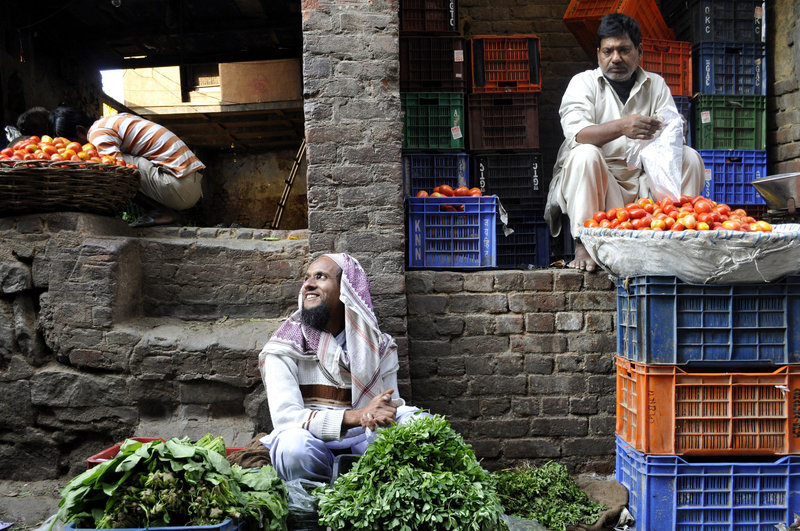NEW DELHI – India’s commerce minister said Friday that the decision to open the country’s $400 billion retail sector to global chains such as Walmart has a built-in safety net for small shops and farmers.
Anand Sharma told reporters that the Indian Cabinet’s decision late Thursday allowing 51 percent foreign ownership of supermarkets would vastly improve decrepit infrastructure that causes massive food waste in a country plagued by malnutrition and high inflation.
Sharma said the new rule would only apply in cities with more than 1 million people. The minimum investment would be $100 million and half of this would have to be invested in rural infrastructure and refrigerated transport and storage. Thirty percent of the produce sourced by the retailer would also have to come from small and medium enterprises.
Top retailers such as Walmart and Tesco have lobbied for years for a chance to build stores in the nation of 1.2 billion people, and political deadlock on long-promised reforms in retail and other areas has helped cool foreign investor interest in India. Foreign retailers have Indian partners in wholesale operations, but no retail stores.
The Cabinet also allowed 100 percent foreign ownership of single-brand retail operations, up from 51 percent.
Advocates see the move as a way to strengthen India’s creaking food distribution system.
If companies like Walmart and Tesco can open shops of their own, the investments they make in improving farming techniques and getting produce into stores more efficiently could lower food inflation and possibly raise rural incomes.
Sharma said the policy would have a “multiplier effect” and tens of millions of people would gain jobs.
Analysts say India’s darkening economic prospects gave fresh urgency to the decadelong talks on opening up India’s retail sector. Many see Thursday’s move as an attempt by the ruling Congress Party to reassert its leadership, which has been weakened by corruption scandals, soaring inflation and slowing growth.
“When the government’s credibility seems to be under significant question, this is one way to give a message that the government is still in business and it means business,” said Arvind Singhal, chairman of retail consultancy Technopak Advisors.
The Cabinet this month also indicated that it is open to allowing 26 percent foreign investment in pension fund management — another headline item in the Congress Party’s promised second wave of economic reforms, which follow a round of liberalization forced by a balance-of- payments crisis in the early 1990s.
The central bank has raised interest rates by 5.25 percentage points over the last 18 months but that hasn’t been enough to control runaway inflation or the rupee’s freefall. Food inflation, which quickly becomes a political issue in India, has been bouncing into the double digits since 2008 and now stands at 9.1 percent.
“Monetary policy interventions have not been able to control inflation,” Singhal said. “Now they have to look into supply-side policy, which could have an impact.”
International investors, who have grown increasingly wary of corruption, surprise tax bills and shifting regulations in India, have also put pressure on the government to make good on old promises to grant them greater access.
Rajan Bharti Mittal, vice chairman and managing director of Bharti Enterprises, said Friday that the retail move was a “major landmark in India’s economic reforms process.”
Bharti’s joint venture with Wal-mart has 13 wholesale outlets in India and sources produce from thousands of farmers.
“We have always stated that development of organized retail in India will bring immense benefits across the value chain — from farmers to small manufacturers and above all to consumers, while creating enormous employment opportunities at the bottom of the pyramid,” Mittal said in a statement.
Walmart, British-based Tesco PLC and French-based retailer Carrefour welcomed the decision.
“This legal evolution should contribute to modernize the Indian food supply chain and to fight against food inflation for the benefit of Indian customers,” Carrefour said in a statement.
The change, which does not require approval by India’s fractious Parliament, was opposed by the Trinamool Congress Party, a key partner in the ruling coalition, and the main opposition BJP party. The country has struggled to find consensus because of concerns that competition from the foreign retail giants could hurt millions of small shopkeepers, as well as the poor.
Sharma said the new policy had been reached through a “transparent and democratic process of consultation with all the stake holders.”
India’s $400 billion retail sector is the nation’s second-largest employer, after agriculture, according to consulting firm Deloitte.
Ashish Sanyal, managing director of retailing consultancy AMP Retail Services, said small businesses had nothing to fear from the big chains.
“At the end of the day this is like the high tide. All boats will rise. We will learn from the big retailers,” he said.
Copy the Story Link
Send questions/comments to the editors.



Success. Please wait for the page to reload. If the page does not reload within 5 seconds, please refresh the page.
Enter your email and password to access comments.
Hi, to comment on stories you must . This profile is in addition to your subscription and website login.
Already have a commenting profile? .
Invalid username/password.
Please check your email to confirm and complete your registration.
Only subscribers are eligible to post comments. Please subscribe or login first for digital access. Here’s why.
Use the form below to reset your password. When you've submitted your account email, we will send an email with a reset code.